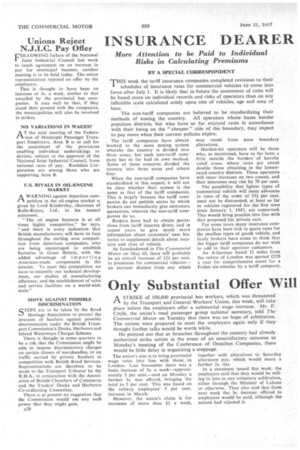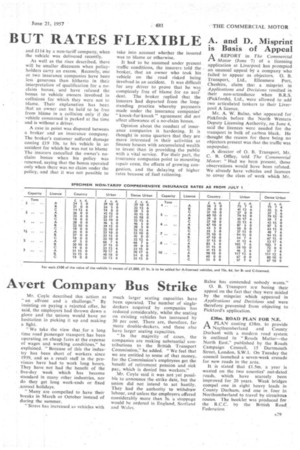INSURANCE DEARER BUT RATES FLEXIBLE
Page 30

Page 31

If you've noticed an error in this article please click here to report it so we can fix it.
More Attention to be Paid to Individual Risks in Calculating Premiums
BY A SPECIAL CORRESPONDENT THIS week the tariff insurance companies completed revisions to their schedules of insurance rates for commercial vehicles tOcome into force after July 1. It is likely that in future the assessment of rates will be based more on individual records and risks of operators than on any inflexible scale calculated solely upon size of vehicles, age and area of base.
The non-tariff companies are believed to be standardizing their methods of zoning the country. All operators whose bases border populous districts, but who have so far enjoyed rates in accordance with their being on the " cheaper" side of the boundary, may expect to pay more when their current policies expire.
, The tariff companies have always worked to the same zoning system whereby the country is divided into three areas, but each non-tariff company has so far had its own method. Some of these concerns divided the country into three areas and others four.
When the non-tariff companies have standardized in this respect, it will not be clear whether their system is the same as that of the tariff companies. This is largely because the tariff companies do not publish scales by which brokers can immediately give customers quotations, whereas the non-tariff companies do so.
Brokers have had to obtain ,quotations from tariff insurers direct, and in recent years to give much more information about customers' case histories to supplement details about location and class of vehicle.
As foreshadowed in The Commercial Motor on May 10, there will probably be an overall increase of 12+ per cent. in premiums for commercial vehicles— an increase distinct from any which
may result from zone boundary alterations.
Hardest-hit operators will be those who, as mentioned, have so far been little outside the borders of heavily rated areas, where rates are about double those obtaining in the lowestrated country districts. These operators will incur-increases on two counts, and their insurance may rise by 70 per cent.
The possibility that lighter types of commercial vehicle will incur advances in rates of the order of 33} per cent. must not be discounted, at least so far as vehicles registered for the first time since January 1, 1947, are concerned. This would bring practice into line with that proposed for private cars.
For some years many insurance companies have been loth to quote rates for the smallest types of goods vehicle, and lately brokers have come to think that the bigger tariff companies do not wish to add to their operator customers.
An A-licensee based 12 miles from the centre of London was quoted £320 a year for comprehensive cover for a Foden six-wheeler by a tariff company, and £114 by a non-tariff company, when the vehicle was delivered recently.
As well as the rises described, there will be smaller discounts when policyholders carry an excess. Recently, one or two insurance companies have been less generous than hitherto in their interpretation of qualification for a noclaim bonus, and have refused the bonus to vehicle owners involved in collisions for which they were not to blame. Their explanation has been that an owner can be held to be free from blame in a collision only if the vehicle concerned is parked at the time and is without a driver.
A case in point was disputed between a broker and an insurance company. The broker's customer suffered damage costing £19 10s. to his vehicle in an accident for which he was not to blame The insurers cancelled the owner's noclaim bonus when his policy was renewed, saying that the bonus operated only when there was no claim under the policy, and that it was not possible to take into account whether the insured was to blame or otherwise.
It had to be assumed under present traffic conditions, the insurers told the broker, that an owner who took his vehicle on the road risked being involved in an accident. It was difficult for any driver to prove that he was completely free of blame for an accident. The broker replied that the insurers had departed from the longstanding practice 'whereby payments made under the insurance companies' " knock-for-knock" agreement did not affect allowance of a no-claim bonus.
Opinion about the conduct of insurance companies is hardening. It is thought in some quarters that they are more interested in their activities as finance houses with accumulated wealth to invest than in providing the public with a vital service. For their part, the insurance companies point to mounting repair costs, the effects of growing congestion, and the delaying of higher rates because of fuel rationing.




























































































